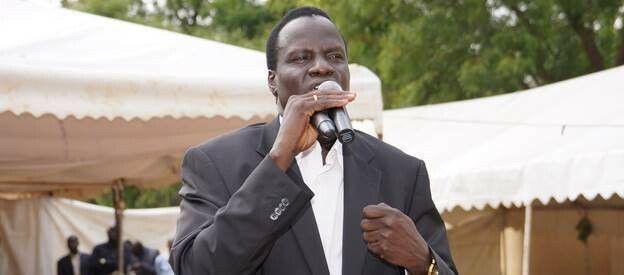The president’s office has written to the Council of States that the upper house of parliament cannot withdraw confidence in Unity State Governor Dr. Joseph Monytuil and that the members exceeded their constitutional mandate.
On Monday, the Council of States summoned Governor Monytuil to answer questions on insecurity incidents in the state and the summary execution of rebel officers in Mayom County earlier this month.
The legislators then passed a vote of no confidence against the governor, who is a member of the SPLM Party, and asked him to tender his resignation or be fired through a presidential decree for allegedly failing to control insecurity in the state.
The letter dated 25 August addressed to the Council of States speaker, Deng Deng Akon, and signed by the minster of presidential affairs, Dr. Barnaba Marial Benjamin, was fraught with legal interpretations and said the upper house of parliament could only censor the embattled governor with a three-quarters majority of the combined parliament.
Dr. Marial wrote that the said Article 59(b), which the Council of States has invoked in “withdrawing confidence” from the Governor of Unity State, provides that: “The Council of States shall be competent to issue resolutions and directives that may guide all levels of Government in accordance with the provisions of Article 47, 48, 49 of the Constitution”.
“However, the Council of States, in exercising Its Constitutional mandate, ought not to have interpreted the said provision in isolation, but rather should have been construed together with the provisions of Articles 164 (4)(a), 49(1)(c)(i), 48(2)(b) and Schedule A, items 2 and 32 of the Constitution,” he wrote.
Dr. Marial said the phrase ‘withdrawal of confidence’ that the Council of States invoked is as good as passing a vote of no confidence, which Is an exclusive constitutional mandate of the state Legislative Assembly under Article 164(4)(a) of the constitution.
“And As much as the Council of States, under Article 59(c) of the Constitution, has an oversight role over the state government, Article 49(1)(c)(i) of the constitution equally reiterates that government organs at all levels shall perform their functions and exercise their powers so as not to encroach on or assume the powers or functions conferred upon any other level except as provided for in the constitution,” he wrote.
“By the same token, Article 48(2)(b) further makes it mandatory for the national government to respect the powers devolved to the states and local government,” he added.
Dr. Marial said that the upper house ought to have been guided by the relevant constitutional provisions in order to avoid acting beyond its legal mandate, as it has been in this matter.
He said defense and security are exclusive to the national government.
“On the ground of failure by the governor to provide security in Unity State Including its environs, the Council of States should have directed its mind to Schedule A, Items 2 and 32 of the constitution, where defense and national security matters are the exclusive executive powers of the national government, but not the state government,” Marial wrote. “Rather, the two levels of government may have to coordinate on issues of defense and security.”
The minister said the Council of States should have invoked the provisions of Article 59(e) A of the constitution by requesting statements from either the governor or the national ministers of defense and security to show cause why there is rampant insecurity in Unity State and its environs.




